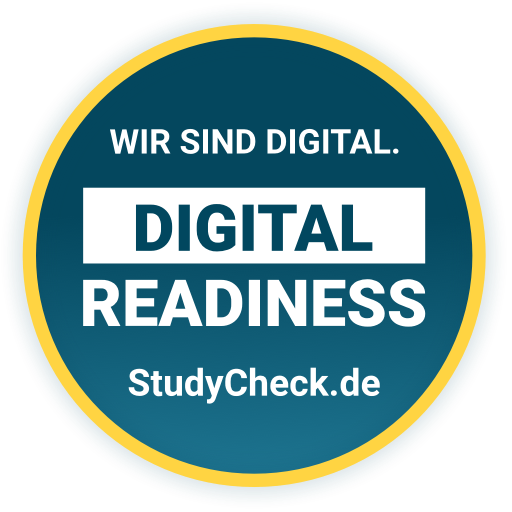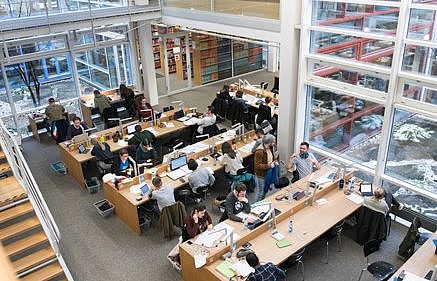The world of tomorrow
From AI to software systems and secure IT systems as a research focus.
The world of computer science is diverse and a driver of innovation when it comes to changing the world of tomorrow.

Master of Science (MSc)
120
4

This diagram is a simplified illustration. You can find detailed information on our current Study Curriculum
From AI to software systems and secure IT systems as a research focus.
The world of computer science is diverse and a driver of innovation when it comes to changing the world of tomorrow.
The master's program in computer science deepens the knowledge acquired in the bachelor's program and enables students to focus on a specific area of computer science through a broad, modularized range of courses and projects covering a wide variety of topics. The program concludes with a master's thesis, in which students independently work on a current topic from their area of specialization. Here, as well as in projects or assistant positions, students have the opportunity to work in international research teams at the university.
At Ulm University, computer science students benefit from excellent support. Small exercise groups and tutorials, targeted support for study groups, and additional offerings such as programming workshops and learning platforms make it easier to get started, especially in the early semesters. There is a trusting relationship between students, professors, and assistants. The commitment of the teaching staff and student tutors is aimed at the success of each individual. In the master's program, students can choose specializations from a wide range of subjects, while project and master's theses enable them to participate in research projects at the computer science institutes.
The master's program is divided into core subjects, advanced subjects, and a project, supplemented by a seminar, supplementary subjects, and the master's thesis. In the core subjects of practical, theoretical, and technical computer science, 12 credit points must be completed in each subject, usually through two modules of 6 credit points each. In the specialization area, basic modules from the bachelor's program can be taken, provided they have not been examined there. This flexibility allows for a broad education in the bachelor's program and a targeted specialization in the master's program, e.g., from artificial intelligence in the bachelor's program to process management or embedded systems in the master's program. The core education is followed by in-depth topics and a practice-oriented project. The program ends with a master's thesis.
Our graduates acquire in-depth and comprehensive knowledge of mathematics, computer science, and natural sciences. This enables them to engage in scientific work and act responsibly in their professional activities and in society. They have a critical awareness of new findings in their discipline.
Our graduates can analyze and solve problems scientifically, even with incomplete or competing specifications. They abstract complex problems, develop innovative methods for solving fundamental problems, and create new scientific approaches. They develop concepts for complex issues, often in an interdisciplinary manner, and develop new works, processes, and methods. Their scientific judgment enables them to work with incomplete information, recognize contradictions, and deal with them.
Our graduates can methodically combine knowledge from different areas, deal with complexity, and quickly familiarize themselves with new tasks. They also reflect responsibly on the non-technical implications of their actions and critically question existing methods in order to further develop them if necessary.
A great way to broaden your horizons in a discipline is to study at a foreign university. Ulm University students can apply for one or two semesters abroad at numerous universities, both throughout Europe as part of the ERASMUS programme and outside Europe. If lectures are not required, internships and theses at other universities are also possible.
Ulm University has exchange agreements with over 100 universities in 26 countries.
International Office

Studieren in Ulm
Große Abschlussfeier am Münsterplatz
A Brief Introduction to Ulm
The Ulm University is located between Stuttgart and Munich in a technology-oriented industrial environment with medium-sized global market leaders and large corporations such as Airbus, BMW, Bosch, Daimler, IBM, Siemens, and Zeiss. Medium-sized IT companies in particular value the research-oriented university education for innovative product developments. Computer science graduates find excellent local and international job opportunities in research, development, technical sales, or production. Numerous research collaborations enable internships, working student positions, and practical theses. The method-oriented education optimally prepares students for entry-level positions. Master's graduates are also qualified for research and doctoral studies, supported by local opportunities in the Wissenschaftsstadt and University.
Welcome to the most liveable city in Germany. In Albert Einstein's birthplace, scientific research, leisure, top employers and culture come together in a unique way. Top locations and events such as the Ulmer Zelt, Nabada or the Donaufest attract visitors to the quaint streets. Here you feel at home!
Copyright: City of Ulm
Last step: If you can answer many of these questions positively, then the Master's program in Computer Science may be the right choice for you!
Any Questions? Acacademic advising office